初一英语听课记录范文
总结初中英语听课记录十篇

文件编号: 14-39-7E -4C -1D
整理人 尼克 作为一名英语教师除了上好自己的每一节
作为一名英语教师,除了上好自己的每一节课外,还需要不断地提升自己,可以通过聆听其他教师、专家的课堂得到进步,在听课的过程中,除了汲取别人的优点,还可以对这一节课进行反思,提出自己的想法、意见。
这一周听了十位老师优秀教师的十节精彩的课堂演示,也深刻领悟郝慧等十位英语学科带头人、名教师、教研员的精彩点评,让我受益匪浅。
那么我们如何才能去听好课呢?
我认为,听课不仅是注重这一过程,之前的准备工作也非常重要,听课前,可以先询问教学内容,同时把课本找来,自己先要对教学内容有一定的了解,想一想如果是自己去教学,这节课应当如何去教,同时预想课堂上可能会出现的问题,这样在听课的时候就不会显得毫无头绪。
在听课的时候,教师也要高度集中注意力,在听的同时要注意思考,观察授课教师的一言一行,同时记录下听课的内容。
学生的反应决定了一堂课的好坏,所以也要通过观察学生的情绪、习惯、课堂反应等等去评价这一节课。
总之,一节课的好坏需要从多个方面去判断。
听完课后不能就一了了之,一定要注意及时的反思与思考,翻翻听课记录,或者与授课教师进行交谈,在分析总结他人时要注意研究比较,取长补短。
吸取他人有益经验,改进自己的教学。
多听、多想、多总结,这是我们身为英语教师必须要做到的,只
有这样,我们的教学才能不断进步。
整理丨尼克
本文档信息来自于网络,如您发现内容不准确或不完善,欢迎您联系我修正;如您发现内容涉嫌侵权,请与我们联系,我们将按照相关法律规定及时处理。
英语听课记录范文(实用6篇)
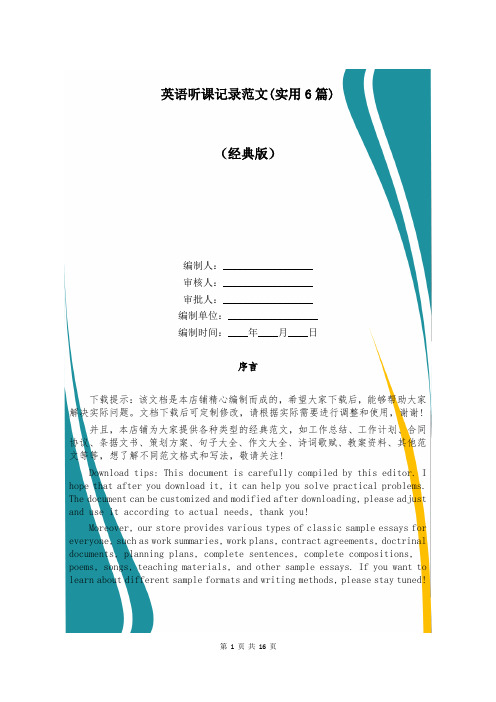
英语听课记录范文(实用6篇)(经典版)编制人:__________________审核人:__________________审批人:__________________编制单位:__________________编制时间:____年____月____日序言下载提示:该文档是本店铺精心编制而成的,希望大家下载后,能够帮助大家解决实际问题。
文档下载后可定制修改,请根据实际需要进行调整和使用,谢谢!并且,本店铺为大家提供各种类型的经典范文,如工作总结、工作计划、合同协议、条据文书、策划方案、句子大全、作文大全、诗词歌赋、教案资料、其他范文等等,想了解不同范文格式和写法,敬请关注!Download tips: This document is carefully compiled by this editor. I hope that after you download it, it can help you solve practical problems. The document can be customized and modified after downloading, please adjust and use it according to actual needs, thank you!Moreover, our store provides various types of classic sample essays for everyone, such as work summaries, work plans, contract agreements, doctrinal documents, planning plans, complete sentences, complete compositions, poems, songs, teaching materials, and other sample essays. If you want to learn about different sample formats and writing methods, please stay tuned!英语听课记录范文(实用6篇)英语听课记录范文第1篇五彩缤纷丰收11、秋天的雨香甜好闻(钥匙)传递信息欢乐听课评析这堂课的板书简明扼要地反映了课文的主要资料,脉络清楚,丰收和欢乐两个词语点明了课文的中心,深化了文章的主题。
英语听课记录及评析范文5篇

英语听课记录及评析范文5篇1. Today's lecture was about the impacts of climate change on the global environment. The professor discussed the rise in global temperatures and the resulting effects on weather patterns, sea levels, and ecosystems. He also emphasized the importance of reducing carbon emissions and transitioning to renewable energy sources. Overall, the lecture was informative and timely, given the current state of our planet's environment.2. The lecture focused on the concept of cultural relativism and its implications for understanding different societies and their customs. The professor highlighted the importance of suspending judgment and viewing each culture within its own context. He also discussed the challenges of balancing cultural relativism with universal human rights. It was a thought-provoking lecture that encouraged us toreconsider our preconceived notions about cultures different from our own.3. During today's class, the topic was the French Revolution and its impact on modern politics and society. The professor emphasized the role of Enlightenment ideas infueling the revolutionary fervor and the subsequent rise of democratic principles. He also discussed the legacy of the revolution in shaping France and the rest of Europe. It wasan engaging lecture that shed light on the lastingsignificance of this pivotal historical event.4. The lecture today was on the principles of microeconomics, specifically the concept of supply and demand. The professor used real-world examples to illustrate how changes in supply and demand affect prices and market equilibrium. He also discussed the factors that can shift the supply and demand curves. Overall, the lecture provided asolid foundation for understanding the basics of microeconomics.5. Today's lecture delved into the topic of human resource management within organizations. The professor discussed various strategies for recruiting, training, and retaining employees, as well as the importance of creating a positive work culture. He also addressed the challenges of managing a diverse workforce and the role of HR in addressing workplace conflicts. It was a practical and insightfullecture that highlighted the critical role of HR in organizational success.。
关于初一英语听课记录

关于初一英语听课记录【篇一】初一英语听课记录李老师讲的是四年级的一节英语课,四年级学生对英语已经有了一定的了解而且也有了一年学习英语的基础,对英语学习有较高的学习兴趣。
李老师根据这点课上以学生为主体通过各种各样的教学方法进行愉快的教学,充分调动了学生学习英语的积极性,课堂气氛活跃,目标达成率较高。
现将本节课的成功之处和需改进的地方总结如下:1教学目标明确,重难点突出,教学结构清晰,通过课前播放英语歌曲调动学生学习英语的兴趣,通过复习旧知引导新知过渡自然,环环相扣。
2教师个人素质较高,课堂驾奴能力强,口语流利,动作优美,富有激情,具有亲和力和感染力,自身人格魅力较高,使整个一节课神采飞扬。
3注意教学细节,主要体现在给小组用英文字母命名,努力营造一种英语教学的氛围。
4活动方式多样化,有group work, look and read,等一系列活动。
5准备充分,有课件,图片,卡片等。
建议:1讲解过多,应让学生更可能多的进行练习,以达到学会的目的,给学生竟可能多的创设情景,让学生在真实的语境中真是的运用语言。
2尽可能多的运用英语进行教学,给学生创设学习英语的气氛。
3应该充分体现以学生为主体,以老师为主导的作用,让每个学生都能开口说英语,多利用小组或者两人一组进行操练,以达到学生学习英语的主动性。
【篇二】初一英语听课记录上午听了杨老师的英语课,觉得自己又收获了一把。
老师的课堂都很精彩,教学设计巧妙、安排合理、能充分发挥多媒体教学手段、师生关系和谐,取得了不错的教学效果。
下面,我就具体对杨老师这节课说一说我的个人体会,不当之处,请各位多提宝贵意见!一、注重营造和谐融洽的课堂氛围杨老师教态自然、语调亲切,并能不断地鼓励学生,给学生以勇气。
以无私的爱心、童心去包容学生,用甜甜的微笑面对学生,使学生在和谐融洽的课堂氛围中学习,推动了知识的掌握和智力的发展,达到了较好的教学效果。
二、注重遵循学生的发展认知规律1、旧知引入新知。
七年级英语听课记录范文

七年级英语听课记录范文一、听课基本信息。
1. 听课日期:[具体日期]2. 听课教师:[教师姓名]3. 授课教师:[授课教师姓名]4. 授课班级:七年级[X]班。
5. 授课内容:Unit [X],Section A。
二、教学过程。
(一)导入(Lead - in)(5分钟)1. 授课教师通过展示一些与本单元话题相关的图片(如家庭成员的照片),并提问学生:“What can you see in these pictures?”引导学生用简单的英语单词回答,如“father”“mother”“sister”等。
2. 接着,教师播放了一段简短的视频,视频内容是一个家庭聚会的场景,里面有家庭成员之间的互动对话。
播放完视频后,教师提问:“How many people are there in this family? Who are they?”让学生回忆视频内容并作答。
点评:- 导入方式生动有趣,图片和视频能够吸引学生的注意力,迅速将学生带入到英语学习的氛围中。
- 问题设置简单且具有引导性,适合七年级学生的英语水平,能够让学生轻松开口回答,为后面的学习做好铺垫。
(二)知识呈现(Presentation)(15分钟)1. 教师在黑板上写出本单元的重点单词,如“grandfather”“grandmother”“parent”“brother”“uncle”“aunt”等,一边写一边大声朗读单词,让学生跟读。
2. 针对每个单词,教师都给出了相应的例句,例如:“My grandfather is very kind.”“Her grandmother likes reading books.”并通过简单的动作和表情帮助学生理解例句的含义。
3. 接着,教师利用多媒体展示了一个家族树(family tree)的图片,在家族树的各个分支上标注出刚刚学过的单词,然后指着家族树向学生介绍家庭成员之间的关系,如:“Your father and mother are your parents.”“Your father'sbrother is your uncle.”点评:- 单词教学方法多样,既有跟读又有例句展示,并且结合动作和表情,能够让学生更好地掌握单词的发音和用法。
听课记录及评析范文初中英语

听课记录及评析范文初中英语English: During the English class, the teacher introduced a new grammar rule and then went through several practice exercises with the students. The teacher also showed some examples of how to apply the grammar rule in real-life situations, which helped students understand the concept better. After that, the class moved on to reading a short story together. The teacher asked comprehension questions and encouraged students to discuss their thoughts on the story, which not only improved their reading skills but also their speaking ability. Overall, the class was well-organized and engaging, providing students with a combination of grammar practice and reading comprehension.中文翻译: 在英语课上,老师介绍了一个新的语法规则,然后与学生们一起做了几个练习。
老师还展示了如何在现实生活中应用这个语法规则的一些例子,这有助于学生更好地理解这个概念。
之后,班级开始一起阅读一篇短篇故事。
老师提出了理解问题,并鼓励学生讨论他们对故事的看法,这不仅提高了他们的阅读能力,也提高了他们的口语能力。
初中英语听课记录30篇
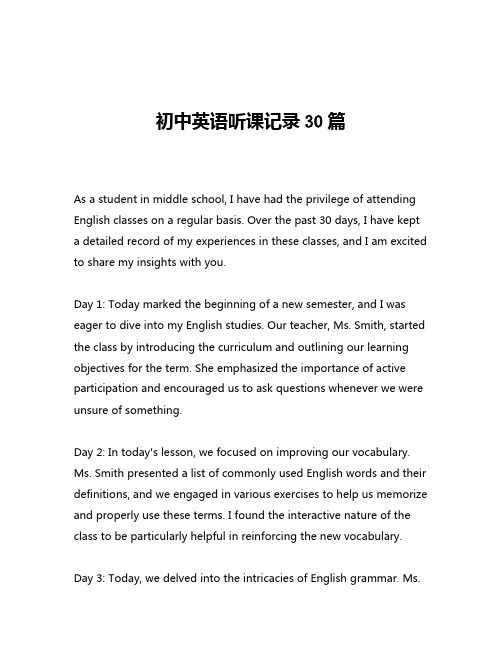
初中英语听课记录30篇As a student in middle school, I have had the privilege of attending English classes on a regular basis. Over the past 30 days, I have kept a detailed record of my experiences in these classes, and I am excited to share my insights with you.Day 1: Today marked the beginning of a new semester, and I was eager to dive into my English studies. Our teacher, Ms. Smith, started the class by introducing the curriculum and outlining our learning objectives for the term. She emphasized the importance of active participation and encouraged us to ask questions whenever we were unsure of something.Day 2: In today's lesson, we focused on improving our vocabulary. Ms. Smith presented a list of commonly used English words and their definitions, and we engaged in various exercises to help us memorize and properly use these terms. I found the interactive nature of the class to be particularly helpful in reinforcing the new vocabulary.Day 3: Today, we delved into the intricacies of English grammar. Ms.Smith explained the different parts of speech and their functions within a sentence. We then had the opportunity to apply our knowledge by identifying the various grammatical elements in sample sentences. I was surprised by how much I was able to learn in just one class period.Day 4: This class was dedicated to practicing our English writing skills. Ms. Smith provided us with a prompt and asked us to compose a short essay. I found this exercise to be both challenging and rewarding, as it allowed me to put my newly acquired vocabulary and grammar knowledge into practice.Day 5: In today's lesson, we explored the importance of pronunciation and intonation in the English language. Ms. Smith led us through a series of tongue twisters and dialogues, encouraging us to pay close attention to our articulation and the rhythm of our speech. I found this activity to be particularly helpful in improving my overall fluency.Day 6: Today, we focused on listening comprehension. Ms. Smith played a series of audio recordings, ranging from news reports to casual conversations, and asked us to answer comprehension questions. I found this exercise to be quite challenging, as it required me to actively listen and process the information being presented.Day 7: In this class, we explored the cultural aspects of the English-speaking world. Ms. Smith discussed the various customs, traditions, and social norms of different English-speaking countries. I found this to be a fascinating and enlightening lesson, as it helped me understand the cultural context behind the language.Day 8: Today, we delved into the world of English literature. Ms. Smith introduced us to a classic short story and led a discussion on the themes, characters, and literary devices used by the author. I was captivated by the depth and complexity of the story, and I found myself eager to explore more works of English literature.Day 9: In this lesson, we focused on improving our English conversation skills. Ms. Smith divided the class into pairs and asked us to engage in a series of role-playing exercises. I found this activity to be both challenging and rewarding, as it allowed me to practice my speaking skills in a real-world context.Day 10: Today, we explored the use of idioms and colloquial expressions in the English language. Ms. Smith presented a variety of common idioms and their meanings, and we discussed how these expressions are used in everyday speech. I found this lesson to be particularly enlightening, as it helped me understand the nuances of the English language.Day 11: In this class, we delved into the world of English poetry. Ms. Smith introduced us to a selection of classic poems and encouraged us to analyze the poetic devices used by the authors. I found this to be a thought-provoking and enriching experience, as it allowed me to appreciate the artistry and creativity inherent in the English language.Day 12: Today, we focused on improving our English reading comprehension skills. Ms. Smith provided us with a series of short passages and asked us to answer questions about the content. I found this exercise to be challenging but rewarding, as it helped me to better understand and interpret written English.Day 13: In this lesson, we explored the use of English in the professional world. Ms. Smith discussed the importance of effective communication in the workplace and provided us with tips and strategies for writing professional emails, resumes, and other business documents. I found this lesson to be particularly relevant and applicable to my future aspirations.Day 14: Today, we delved into the world of English grammar once again, this time focusing on more complex sentence structures and verb tenses. Ms. Smith presented a series of examples and encouraged us to practice using these grammatical concepts in our own writing and speaking. I found this lesson to be both challengingand enlightening, as it helped me to better understand the nuances of the English language.Day 15: In this class, we explored the use of English in the media and popular culture. Ms. Smith presented a series of examples, ranging from news articles to song lyrics, and encouraged us to analyze the language used in these contexts. I found this lesson to be particularly engaging and relevant, as it helped me to understand how the English language is used in the real world.Day 16: Today, we focused on improving our English pronunciation and accent. Ms. Smith led us through a series of exercises designed to help us improve our articulation and intonation. I found this lesson to be particularly helpful, as it allowed me to identify and address any areas of weakness in my spoken English.Day 17: In this lesson, we delved into the world of English literature once again, this time focusing on a more contemporary work. Ms. Smith introduced us to a modern novel and led a discussion on the themes, characters, and writing style of the author. I found this lesson to be both engaging and thought-provoking, as it allowed me to explore the evolution of the English language in a modern context.Day 18: Today, we explored the use of English in the field of science and technology. Ms. Smith presented a series of technical terms andencouraged us to discuss their meanings and applications. I found this lesson to be particularly interesting, as it helped me to understand the role of English in the global scientific community.Day 19: In this class, we focused on improving our English writing skills once again, this time with a focus on persuasive writing. Ms. Smith provided us with a prompt and asked us to compose a persuasive essay. I found this exercise to be both challenging and rewarding, as it allowed me to put my knowledge of vocabulary, grammar, and rhetorical devices into practice.Day 20: Today, we delved into the world of English idioms and slang once again. Ms. Smith presented a series of common expressions and encouraged us to discuss their meanings and origins. I found this lesson to be particularly enlightening, as it helped me to better understand the nuances of the English language and how it is used in everyday speech.Day 21: In this class, we explored the use of English in the field of arts and culture. Ms. Smith presented a series of examples, ranging from film reviews to art critiques, and encouraged us to analyze the language used in these contexts. I found this lesson to be particularly engaging and relevant, as it allowed me to understand the role of English in the global cultural landscape.Day 22: Today, we focused on improving our English listening comprehension skills once again, this time with a focus on more complex audio recordings. Ms. Smith played a series of interviews and news reports, and asked us to answer a series of comprehension questions. I found this exercise to be particularly challenging, but also rewarding, as it helped me to better understand the nuances of spoken English.Day 23: In this lesson, we delved into the world of English grammar once again, this time focusing on the use of modals and conditional structures. Ms. Smith presented a series of examples and encouraged us to practice using these grammatical concepts in our own writing and speaking. I found this lesson to be particularly enlightening, as it helped me to better understand the subtleties of the English language.Day 24: Today, we explored the use of English in the field of business and finance. Ms. Smith presented a series of business-related terms and encouraged us to discuss their meanings and applications. I found this lesson to be particularly relevant and applicable to my future aspirations, as it helped me to understand the role of English in the global business world.Day 25: In this class, we focused on improving our English speaking skills once again, this time with a focus on more formal andprofessional contexts. Ms. Smith divided the class into pairs and asked us to engage in a series of role-playing exercises, such as conducting a job interview or delivering a presentation. I found this activity to be both challenging and rewarding, as it allowed me to practice my speaking skills in a more structured and professional environment.Day 26: Today, we delved into the world of English literature once again, this time focusing on a work of non-fiction. Ms. Smith introduced us to a historical or biographical text and led a discussion on the use of language and the author's writing style. I found this lesson to be particularly enlightening, as it allowed me to appreciate the diversity and depth of the English language in a non-fictional context.Day 27: In this class, we explored the use of English in the field of law and politics. Ms. Smith presented a series of legal and political terms and encouraged us to discuss their meanings and applications. I found this lesson to be particularly relevant and thought-provoking, as it helped me to understand the role of English in the global political and legal landscape.Day 28: Today, we focused on improving our English writing skills once again, this time with a focus on creative writing. Ms. Smith provided us with a prompt and asked us to compose a short story orpoem. I found this exercise to be both challenging and rewarding, as it allowed me to tap into my creativity and express myself through the medium of the English language.Day 29: In this lesson, we delved into the world of English idioms and metaphors once again. Ms. Smith presented a series of common expressions and encouraged us to discuss their meanings and origins.I found this lesson to be particularly enlightening, as it helped me to better understand the nuances of the English language and how it is used to convey complex ideas and emotions.Day 30: Today, we wrapped up the semester with a comprehensive review of all the topics we had covered over the past 30 days. Ms. Smith led a discussion on the key takeaways and encouraged us to share our thoughts and reflections on our English language learning journey. I found this lesson to be particularly valuable, as it allowed me to synthesize all the knowledge and skills I had acquired over the course of the semester.Overall, my 30-day record of my middle school English class has been a truly enriching and enlightening experience. I have learned so much about the English language, its cultural and historical context, and its practical applications in the real world. I am grateful to Ms. Smith for her dedication and expertise, and I am excited to continue my English language learning journey in the years to come.。
听课记录英语(推荐6篇)

听课记录英语(推荐6篇)听课记录英语第1篇学生对知识的掌握较好,从中可看出热爱上了这门功课,大多同学能围绕教师的提问动脑思考。
授课形式多样,通过讲授讨论朗读等方式,达到了示范课的目的。
教师能在组织旧知识的基础上讲新课,且从旧知到新知的过渡自然,学生积极性也高。
教师能很有耐心地进行个别指导,很有亲和力。
但示范效果不好,其实在这里分组学习会更好。
课前准备充分,充分利用了多媒体教学,为学生创造了良好的语言学习情境,激发了学生的学习热情,调动了学生的学习积极性。
3月6日听了邵XX老师的《美好人生我选择》——直面升学与择业,认为本节课学习内容是与学生生活、学习紧密结合、息息相关的课题,教师授课中有针对性地探讨了学生面临的问题及相应对策,教学中能密切结合校园内及学生身边熟悉的事件开展教学,深入浅出,启发学生进行思考,开展讨论。
教师语言表述清晰、精要、幽默。
建议教师要对学生的分析、提炼、总结问题的能力加强培养,提高要求。
3月8日听了陈XX老师的一堂课,认为本节语法课内容紧扣知识要点,所选内容突出了重点、难点,加深了学生的体会,便于学生理解。
教师语法授课中讲解能注意引导、启发。
在课堂中学生朗读能力培养还略显欠缺,各环节紧凑性还可加强,老师对学生纪律要提高要求。
3月8日听了秦XX老师的《透镜光的折射》一课,认为教师语言表述能力好,课堂讲解层次清晰,注重启发、拓展,教师的基本功扎实,讲解中注重知识的记忆、整理,结合习题在授课中及时巩固,并做到精批精讲,板书相当清晰、规范。
但做为复习课,对学生能力要求可再提高一些,课堂上可适当给予学生互动的空间。
教学重难点突出,板书清晰有条理。
教学步骤设计合理,由浅入深,循序渐进。
教师基本功扎实,知识讲解准确,教学设计合理,始终以学生为主体,自主学习,小组交流讨论,上台交流展示等形式,师生配合默契,取得了较好的学习效果。
听课记录英语第2篇根据四年级学生好奇心浓厚的特点,并根据小学英语中要注意培养学生发散性思维能力,认真观察,注意倾听并能用英语进行简单交流的目的,联系本课特点,从培养的语言能力入手,通过各种方式,运用学生身边的事物,合理地运用语言材料,培养学生的思维与使用英语的能力。
人教版初中英语听课笔记范文10篇
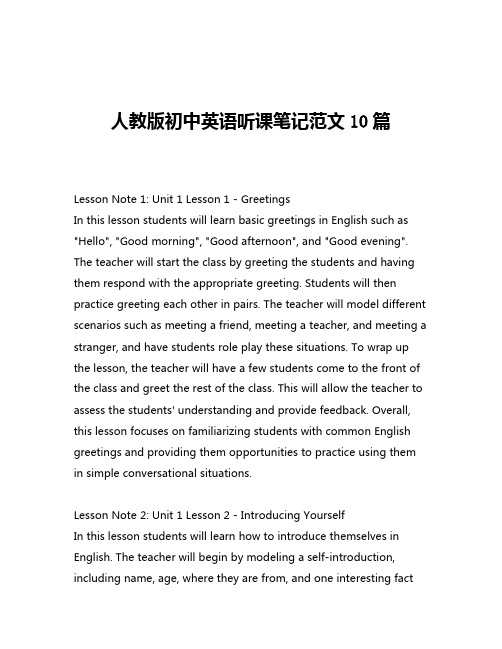
人教版初中英语听课笔记范文10篇Lesson Note 1: Unit 1 Lesson 1 - GreetingsIn this lesson students will learn basic greetings in English such as "Hello", "Good morning", "Good afternoon", and "Good evening". The teacher will start the class by greeting the students and having them respond with the appropriate greeting. Students will then practice greeting each other in pairs. The teacher will model different scenarios such as meeting a friend, meeting a teacher, and meeting a stranger, and have students role play these situations. To wrap up the lesson, the teacher will have a few students come to the front of the class and greet the rest of the class. This will allow the teacher to assess the students' understanding and provide feedback. Overall, this lesson focuses on familiarizing students with common English greetings and providing them opportunities to practice using them in simple conversational situations.Lesson Note 2: Unit 1 Lesson 2 - Introducing YourselfIn this lesson students will learn how to introduce themselves in English. The teacher will begin by modeling a self-introduction, including name, age, where they are from, and one interesting factabout themselves. Students will then practice introducing themselves to the class. The teacher will provide a sentence frame to guide the students "Hello my name is ___ I am ___ years old I am from ___ and I like ___." After the individual introductions, the teacher will have students introduce their classmates to the rest of the class. This will allow students to practice both introducing themselves and others. To wrap up, the teacher may have a small group activity where students have to interview each other and then introduce their partner to the class. This lesson focuses on giving students confidence in presenting personal information about themselves in English.Lesson Note 3: Unit 2 Lesson 1 - Talking about FamilyIn this lesson students will learn vocabulary related to family members and practice describing their own families. The teacher will begin by presenting flashcards with different family member vocabulary words and having students repeat after them. The teacher will then model describing their own family, including the names and ages of family members. Students will then work in pairs to interview each other about their families and prepare to introduce their partner's family to the class. As a wrap up activity, the teacher will call on random students to come to the front and introduce their partner's family to the class. This lesson aims to build students' confidence in using family-related vocabulary and describing their personal family situations in English.Lesson Note 4: Unit 2 Lesson 2 - Talking about PetsIn this lesson students will learn vocabulary related to common pets and practice describing the pets they have at home. The teacher will begin by showing images of different pets and having students name them in English. The teacher will then model describing their own pet, including the pet's name, type, color, and a few personality traits. Students will then work in small groups to discuss the pets they have at home and prepare to introduce one of their group member's pets to the class. As a wrap up, the teacher will call on random groups to come to the front and introduce one of their group member's pets to the class. This lesson focuses on expanding students' pet-related vocabulary and giving them opportunities to practice describing the pets in their lives.Lesson Note 5: Unit 3 Lesson 1 - Talking about Daily RoutinesIn this lesson students will learn vocabulary related to daily routines and practice describing their own daily schedules. The teacher will begin by presenting a list of common daily activities and having students repeat them. The teacher will then model describing their own daily routine using sequencing words like "first", "then", "after that", and "finally". Students will then work individually to write out their own daily schedules and prepare to present them to the class. As a wrap up, the teacher will call on random students to come to the front and describe their daily routines to the class. This lessonaims to build students' ability to talk about their daily lives and use sequencing language in English.Lesson Note 6: Unit 3 Lesson 2 - Telling TimeIn this lesson students will learn how to tell time in English. The teacher will begin by presenting analog and digital clock images and having students practice saying the time shown. The teacher will then model phrases for asking and telling the time, such as "What time is it?" and "It's 3:15." Students will then work in pairs to practice asking and telling the time. As a wrap up, the teacher may have a classroom clock that they use to call out different times and have students write down the time in their notebooks. This lesson focuses on giving students the language skills to communicate about the time in English.Lesson Note 7: Unit 4 Lesson 1 - Talking about HobbiesIn this lesson students will learn vocabulary related to common hobbies and practice describing their own interests. The teacher will begin by presenting images of different hobbies and having students name them in English. The teacher will then model describing their own hobbies, including why they enjoy those activities. Students will then work individually to write about their top 3 hobbies. As a wrap up, the teacher will call on random students to share one of their hobbies with the class. This lesson aims to build students' confidence in using hobby-related vocabulary and discussing their personalinterests in English.Lesson Note 8: Unit 4 Lesson 2 - Talking about Likes and DislikesIn this lesson students will learn how to express likes and dislikes in English. The teacher will begin by presenting a list of common likes and dislikes, such as "I like playing basketball" and "I don't like spicy food", and having students repeat after them. The teacher will then model having a conversation about likes and dislikes with a volunteer student. Students will then work in pairs to interview each other about their likes and dislikes. As a wrap up, the teacher may have students share one thing they like and one thing they dislike with the class. This lesson focuses on giving students the language skills to communicate their personal preferences in English.Lesson Note 9: Unit 5 Lesson 1 - Talking about the WeatherIn this lesson students will learn vocabulary related to weather and practice describing the current weather conditions. The teacher will begin by presenting images of different weather phenomena and having students name them in English. The teacher will then model describing the weather, using phrases like "It's sunny", "It's raining", and "It's cold outside." Students will then work in small groups to discuss the current weather and prepare to present a weather report to the class. As a wrap up, the teacher will call on random groups to come to the front and deliver a short weather report to the class. This lesson aims to build students' ability to discuss weather-relatedtopics in English.Lesson Note 10: Unit 5 Lesson 2 - Talking about SeasonsIn this lesson students will learn vocabulary related to the four seasons and practice describing the characteristics of each season. The teacher will begin by presenting images of the four seasons and having students name them in English. The teacher will then model describing the weather, activities, and clothing associated with each season. Students will then work individually to write a short paragraph describing their favorite season. As a wrap up, the teacher will call on random students to share their paragraphs with the class. This lesson focuses on expanding students' seasonal vocabulary and giving them opportunities to describe seasonal changes in English.。
七年级英语听课记录范文

七年级英语听课记录范文English: In today's lesson, we learned about simple present tense in English. The teacher explained that simple present is used to talk about repetitive actions, general truths, and scheduled events. We practiced conjugating verbs in simple present tense, and the teacher provided examples to help us understand how to use it in sentences. We also learned about the third person singular forms of the verbs, and how to add "s" or "es" to the base form. Additionally, we were introduced to the use of frequency adverbs such as "always", "usually", and "sometimes" when talking about how often something happens in the present. Overall, it was a very informative lesson and I feel more confident in using the simple present tense.中文翻译: 在今天的课上,我们学习了英语中的一般现在时。
初中英语听课笔记范文(共4篇)
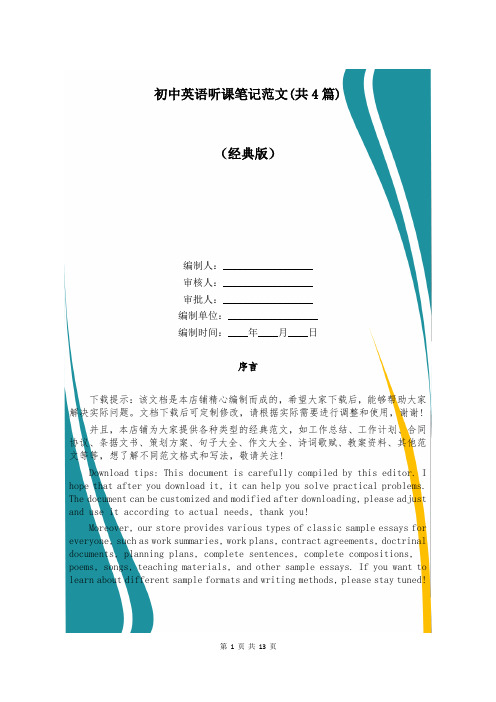
初中英语听课笔记范文(共4篇)(经典版)编制人:__________________审核人:__________________审批人:__________________编制单位:__________________编制时间:____年____月____日序言下载提示:该文档是本店铺精心编制而成的,希望大家下载后,能够帮助大家解决实际问题。
文档下载后可定制修改,请根据实际需要进行调整和使用,谢谢!并且,本店铺为大家提供各种类型的经典范文,如工作总结、工作计划、合同协议、条据文书、策划方案、句子大全、作文大全、诗词歌赋、教案资料、其他范文等等,想了解不同范文格式和写法,敬请关注!Download tips: This document is carefully compiled by this editor. I hope that after you download it, it can help you solve practical problems. The document can be customized and modified after downloading, please adjust and use it according to actual needs, thank you!Moreover, our store provides various types of classic sample essays for everyone, such as work summaries, work plans, contract agreements, doctrinal documents, planning plans, complete sentences, complete compositions, poems, songs, teaching materials, and other sample essays. If you want to learn about different sample formats and writing methods, please stay tuned!初中英语听课笔记范文(共4篇)初中英语听课笔记范文第1篇初中英语的听课笔记1.引语为一般陈述句,变为间接引语时一般由that引导(可省略)2.如果直接引语中的主语为第一人称,变为间接引语时人称要随主语作适当变化3.如果引述动词为一般过去时,间接引语中动词的时态一般推移到过去时间4.其他变化指示代词时间状语地点状语动词this―that today-that day here―there come――go these――those now-then 重点词组:out不让......进入of style不时髦的;过时的打电话给......for付款for要求same as与......同样的style时髦的;流行的on相处;进展much as possible尽可能多kind sof各种;许多the one hand,......(在)一方面......the other hand,......另一方面......初中英语听课笔记范文第2篇学校:20XX年11月16日第三节科目英语年班级6年级3班Unit5Whatdoesshedo?课题课堂教学过程授课教师一.复习全班学生一起读第四单元单词,一遍英语一遍汉语。
初一英语听课记录范文8篇

初一英语听课记录范文8篇大家应该都知道,一般老师听课之后,都会有记录,即使是初一也不例外。
小编的我精心为您带来了8篇《初一英语听课记录范文》,希望能够满足亲的需求。
初一英语听课记录篇四授课教师:李老师教学内容:新目标七年级下册Unit 3Why do you like koalas? Section B (1—3)[教学目标]知识目标:1、学习并掌握What, Why引导的特殊疑问句,2、用Because句型和形容词“ugly, clever, friendly, beautiful, shy ”表示原因,性质、品质。
能力目标:Describe animals; Express preferences情感目标:了解自然,树立自觉保护动物的意识,谈论喜好,展示个性。
[重点难点]重点:1. Words: ugly, clever, friendly, beautiful, shy, other 2. Target Language:What animals do you like?What other animals do you like? Because they’re…and…难点:How to describe animal and express preferences.[教学过程记录]总评1、目标明确,重、难点把握准确,知识主线提炼精确。
2、教学设计体现了“听说课”的教学模式,从复习热身、感知体验、强化巩固到语言应用,设计的思路清晰,步骤明确,体现了“层层递进”的教学原则。
3、设计的流程遵循了学生的认知规律,由感知体验到语言应用,注重了知识获取,能力形成的学习过程。
4、能够突出学生的主体地位,面向全体,每个学生有任务,且每个学生都有展示的机会。
5、通过小组间的合作,引导学生进行自主、探究学习,敢于质疑,善于解惑,学会总结,大胆评价。
6、教学效果良好,学生参与面广,参与机会多,参与的积极性高涨,兴趣浓,知识与能力、过程与方法、情感态度价值观得到了很好的落实。
英语听课记录5篇
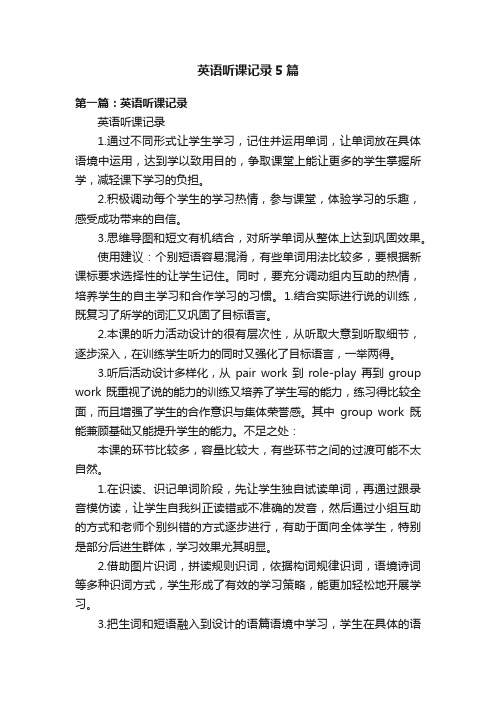
英语听课记录5篇第一篇:英语听课记录英语听课记录1.通过不同形式让学生学习,记住并运用单词,让单词放在具体语境中运用,达到学以致用目的,争取课堂上能让更多的学生掌握所学,减轻课下学习的负担。
2.积极调动每个学生的学习热情,参与课堂,体验学习的乐趣,感受成功带来的自信。
3.思维导图和短文有机结合,对所学单词从整体上达到巩固效果。
使用建议:个别短语容易混淆,有些单词用法比较多,要根据新课标要求选择性的让学生记住。
同时,要充分调动组内互助的热情,培养学生的自主学习和合作学习的习惯。
1.结合实际进行说的训练,既复习了所学的词汇又巩固了目标语言。
2.本课的听力活动设计的很有层次性,从听取大意到听取细节,逐步深入,在训练学生听力的同时又强化了目标语言,一举两得。
3.听后活动设计多样化,从pair work到role-play 再到group work既重视了说的能力的训练又培养了学生写的能力,练习得比较全面,而且增强了学生的合作意识与集体荣誉感。
其中group work既能兼顾基础又能提升学生的能力。
不足之处:本课的环节比较多,容量比较大,有些环节之间的过渡可能不太自然。
1.在识读、识记单词阶段,先让学生独自试读单词,再通过跟录音模仿读,让学生自我纠正读错或不准确的发音,然后通过小组互助的方式和老师个别纠错的方式逐步进行,有助于面向全体学生,特别是部分后进生群体,学习效果尤其明显。
2.借助图片识词,拼读规则识词,依据构词规律识词,语境诗词等多种识词方式,学生形成了有效的学习策略,能更加轻松地开展学习。
3.把生词和短语融入到设计的语篇语境中学习,学生在具体的语境中加强了对单词的理解记忆。
借助思维导图的帮助复述短文,思路清晰条例,降低了难度,增强了学生的自信心。
使用注意事项:1.本节课的容量较大,因此课前要让学生做好提前预习工作。
2.所涉及的每个环节,要以多媒体直观呈现的形式逐一展示给学生,这样才能高效率、高质量地完成学习任务。
七年级英语听课笔记范文10篇
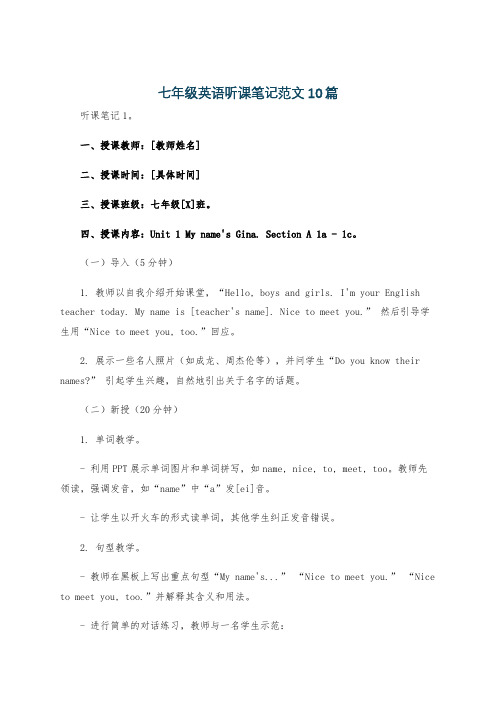
七年级英语听课笔记范文10篇听课笔记1。
一、授课教师:[教师姓名]二、授课时间:[具体时间]三、授课班级:七年级[X]班。
四、授课内容:Unit 1 My name's Gina. Section A 1a - 1c。
(一)导入(5分钟)1. 教师以自我介绍开始课堂,“Hello, boys and girls. I'm your English teacher today. My name is [teacher's name]. Nice to meet you.”然后引导学生用“Nice to meet you, too.”回应。
2. 展示一些名人照片(如成龙、周杰伦等),并问学生“Do you know their names?”引起学生兴趣,自然地引出关于名字的话题。
(二)新授(20分钟)1. 单词教学。
- 利用PPT展示单词图片和单词拼写,如name, nice, to, meet, too。
教师先领读,强调发音,如“name”中“a”发[ei]音。
- 让学生以开火车的形式读单词,其他学生纠正发音错误。
2. 句型教学。
- 教师在黑板上写出重点句型“My name's...”“Nice to meet you.”“Nice to meet you, too.”并解释其含义和用法。
- 进行简单的对话练习,教师与一名学生示范:T: Hello! What's your name?S: My name's Li Ming.T: Nice to meet you.S: Nice to meet you, too.- 然后让学生两人一组进行练习,教师巡视并给予指导。
(三)听力练习(10分钟)1. 教师介绍听力任务,让学生听1a中的对话,圈出听到的名字。
2. 播放听力材料,学生完成任务。
3. 核对答案,教师再次播放听力材料,让学生注意听名字的发音。
(四)课堂小结(3分钟)教师引导学生回顾本节课所学的单词和句型,强调重点单词的发音和句型的用法。
初中英语听评课记录模板范文

初中英语听评课记录模板范文As a student of grade 7, I had the opportunity to attend an English listening and evaluating class. The class was conducted by our English teacher, Mr. Smith. The main objective of the class was to sharpen our listening skills and improve our ability to understand spoken English.Firstly, Mr. Smith played a short audio clip of a conversation between two people discussing their weekend plans. He asked us to pay close attention and take notes while listening. After the clip ended, Mr. Smith asked us a series of questions to test our comprehension of the conversation. He also asked us to share our notes and compare them with those of our classmates. This exercise not only helped us improve our listening skills but also encouraged teamwork and collaboration.Next, Mr. Smith played a dialogue from a movie and asked us to identify the emotions and intentions of the characters based on their tone of voice and choice of words. This was an interesting and challenging task as it required us to consider both verbal and non-verbal cues. Mr. Smith then discussed with us the importance of understanding the subtleties of spoken language in order to fully comprehend the message being conveyed.In the final part of the class, Mr. Smith encouraged us to engage in a role-playing activity where we had to act out a given scenario using appropriate language and intonation. This activity not only tested our listening skills but also provided us with an opportunity to apply what we had learned in a practical setting.Overall, the listening and evaluating class was an enriching experience that not only improved our listening skills but also helped us understand the nuances of spokenEnglish. Mr. Smith's innovative teaching methods and interactive approach made the class both engaging and effective. I look forward to more such classes in the future.。
英语听课评课记录范文(必备15篇)
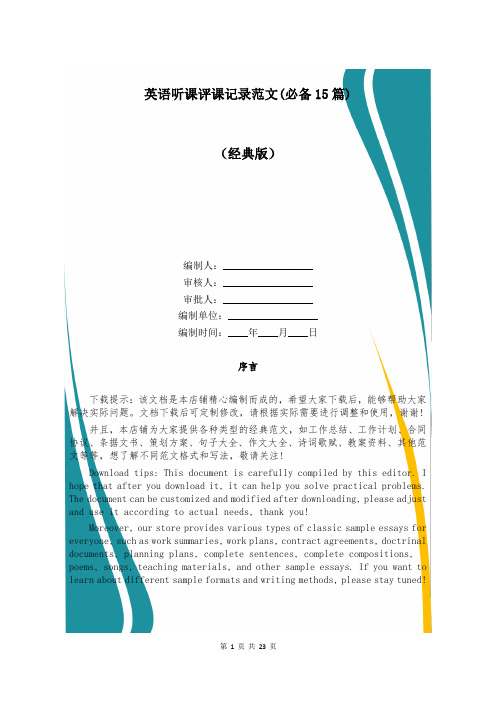
英语听课评课记录范文(必备15篇)(经典版)编制人:__________________审核人:__________________审批人:__________________编制单位:__________________编制时间:____年____月____日序言下载提示:该文档是本店铺精心编制而成的,希望大家下载后,能够帮助大家解决实际问题。
文档下载后可定制修改,请根据实际需要进行调整和使用,谢谢!并且,本店铺为大家提供各种类型的经典范文,如工作总结、工作计划、合同协议、条据文书、策划方案、句子大全、作文大全、诗词歌赋、教案资料、其他范文等等,想了解不同范文格式和写法,敬请关注!Download tips: This document is carefully compiled by this editor. I hope that after you download it, it can help you solve practical problems. The document can be customized and modified after downloading, please adjust and use it according to actual needs, thank you!Moreover, our store provides various types of classic sample essays for everyone, such as work summaries, work plans, contract agreements, doctrinal documents, planning plans, complete sentences, complete compositions, poems, songs, teaching materials, and other sample essays. If you want to learn about different sample formats and writing methods, please stay tuned!英语听课评课记录范文(必备15篇)英语听课评课记录范文第1篇随着学科领域整体改革的深入发展,英语课堂教学也发生可喜的变革。
人教版初中七年级英语听课记录及评析范文
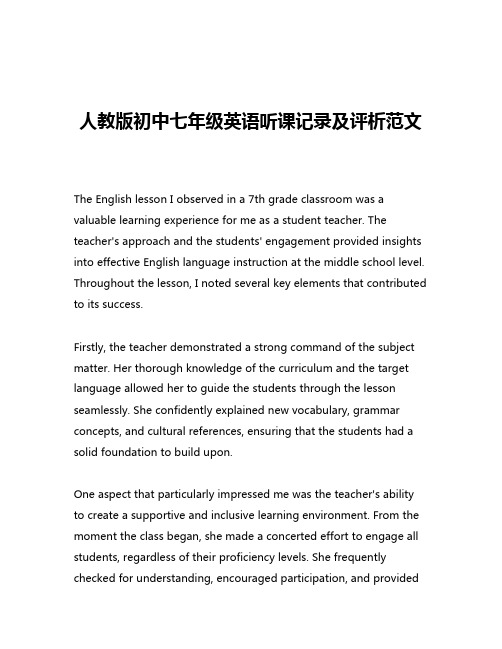
人教版初中七年级英语听课记录及评析范文The English lesson I observed in a 7th grade classroom was a valuable learning experience for me as a student teacher. The teacher's approach and the students' engagement provided insights into effective English language instruction at the middle school level. Throughout the lesson, I noted several key elements that contributed to its success.Firstly, the teacher demonstrated a strong command of the subject matter. Her thorough knowledge of the curriculum and the target language allowed her to guide the students through the lesson seamlessly. She confidently explained new vocabulary, grammar concepts, and cultural references, ensuring that the students had a solid foundation to build upon.One aspect that particularly impressed me was the teacher's ability to create a supportive and inclusive learning environment. From the moment the class began, she made a concerted effort to engage all students, regardless of their proficiency levels. She frequently checked for understanding, encouraged participation, and providedpositive reinforcement to boost the students' confidence.The lesson's structure was also well-planned and organized. The teacher began by reviewing the previous lesson's content, which helped the students connect new information to their existing knowledge. She then introduced the day's topic, providing a clear learning objective and outlining the key points to be covered.Throughout the lesson, the teacher employed a variety of instructional strategies to cater to different learning styles. She utilized visual aids, such as PowerPoint presentations and handouts, to enhance the students' understanding of the material. Additionally, she incorporated interactive activities, such as pair work and group discussions, to encourage active learning and foster collaboration among the students.One particularly effective strategy the teacher used was the integration of authentic materials. By incorporating real-world examples, such as news articles and short videos, she made the content more relatable and engaging for the students. This approach not only improved their comprehension but also exposed them to the practical applications of the English language.The teacher's use of the target language throughout the lesson was also noteworthy. She consistently spoke in English, encouraging thestudents to do the same. This immersive approach allowed the students to develop their listening and speaking skills, as they were constantly exposed to natural language use.Furthermore, the teacher's attention to detail and classroom management skills were commendable. She seamlessly transitioned between activities, maintained a positive and energetic demeanor, and effectively addressed any disruptions or questions that arose.Perhaps the most impressive aspect of the lesson was the level of student engagement. The students were actively participating, asking questions, and demonstrating a genuine interest in the subject matter. This level of engagement can be attributed to the teacher's ability to create a dynamic and interactive learning environment.In conclusion, the English lesson I observed in the 7th grade classroom was a testament to the power of effective teaching. The teacher's subject matter expertise, instructional strategies, and classroom management skills all contributed to the students' learning experience. As a future educator, I will strive to emulate the best practices I witnessed, with the goal of creating similar engaging and meaningful learning opportunities for my own students.。
初一英语听课记录范文.doc

初一英语听课记录范文初一英语听课记录范文篇1授课教师:李老师教学内容:新目标七年级下册Unit 3Why do you like koalas? Section B (1 3) [教学目标]知识目标:1.学习并掌握What, Why引导的特殊疑问句,2.用Because句型和形容词ugly, clever, friendly, beautiful, shy 表示原因,性质、品质。
能力目标:Describe animals; Express preferences情感目标:了解自然,树立自觉保护动物的意识,谈论喜好,展示个性。
[重点难点]重点:1. Words: ugly, clever, friendly, beautiful, shy, other 2. Target Language:What animals do you like?What other animals do you like? Because they re and难点:How to describe animal and express preferences.[教学过程记录]2. 教学设计体现了听说课的教学模式,从复习热身、感知体验、强化巩固到语言应用,设计的思路清晰,步骤明确,体现了层层递进的教学原则。
3. 设计的流程遵循了学生的认知规律,由感知体验到语言应用,注重了知识获取,能力形成的学习过程。
4. 能够突出学生的主体地位,面向全体,每个学生有任务,且每个学生都有展示的机会。
5. 通过小组间的合作,引导学生进行自主、探究学习,敢于质疑,善于解惑,学会总结,大胆评价。
6. 教学效果良好,学生参与面广,参与机会多,参与的积极性高涨,兴趣浓,知识与能力、过程与方法、情感态度价值观得到了很好的落实。
建议:1、教师再多增加一些让学生展示的机会,以便进一步增强学生的自信心、提高其积极性,进而获得成就感;2、教师应进一步锤炼自己的课堂语言,从而使课堂教学可以更加流畅地进行。
英语听课记录及评析范文5篇

英语听课记录及评析范文5篇Yesterday, I attended an English listening class. The teacher played several audio clips of different English accents and dialects for us to practice listening comprehension. I found it challenging to understand some of the accents, especially the British and Australian ones. However, I enjoyed the diversity of voices and learned how to adapt my listening skills to different speech patterns.昨天,我参加了一堂英语听课。
老师为我们播放了几个不同英语口音和方言的音频片段,让我们练习听力理解。
我发现有些口音很难理解,尤其是英国和澳大利亚口音。
但是,我喜欢多样的声音,学会了如何适应不同的语音模式。
In addition to the accent challenge, the class also focused on listening to various types of English speech, such as formal presentations, casual conversations, and interviews. It was eye-opening to hear the different tones, pacing, and vocabulary used in each context. I realized the importance of being able to comprehend and interpret different styles of English communication in real-world situations.除了口音挑战,课堂还专注于听不同类型的英语演讲,比如正式演讲、随意谈话和采访。
七年级英语听课记录范文

七年级英语听课记录范文English:Today I had an English class. Our teacher, Mr. Smith, started the class by asking us to read a passage from a book. Then, he asked us to discuss the main idea of the passage with our classmates. After that, he introduced anew grammar point and gave us some examples to help us understand it better. We took notes while he was explaining.Next, we did a listening exercise. Mr. Smith played an audio clip and asked us to listen carefully and answer some questions about it. We had to pay close attention to the details in the audio clip in order to answer the questions correctly.Then, we moved on to a speaking activity. We weredivided into groups and given a topic to discuss. Eachgroup had to come up with their own ideas and present themto the class. This helped us practice speaking in Englishand also improved our confidence in using the language.Finally, we did a writing exercise. Mr. Smith asked usto write a short paragraph about our weekend activities. Hewalked around the classroom and checked our work, giving us feedback on our writing.Overall, it was a very productive and engaging class.中文:今天我上了一节英语课。
- 1、下载文档前请自行甄别文档内容的完整性,平台不提供额外的编辑、内容补充、找答案等附加服务。
- 2、"仅部分预览"的文档,不可在线预览部分如存在完整性等问题,可反馈申请退款(可完整预览的文档不适用该条件!)。
- 3、如文档侵犯您的权益,请联系客服反馈,我们会尽快为您处理(人工客服工作时间:9:00-18:30)。
初一英语听课记录范文谁有初一上册英语听课记录、词类:英语词类分十种:名词、形容词、代词、数词、冠词、动词、副词、介词、连词、感叹词。
1、名词(n.):表示人、事物、地点或抽象概念的名称。
如:boy, morning, bag, ball, class, orange. 2、代词(pron.):主要用来代替名词。
如:who, she, you, it . 3、形容词(adj..):表示人或事物的性质或特征。
如:good, right, white, orange . 4、数词(num.):表示数目或事物的顺序。
如:one, two, three, first, second, third, fourth. 5、动词(v.):表示动作或状态。
如:am, is,are,have,see . 6、副词(adv.):修饰动词、形容词或其他副词,说明时间、地点、程度等。
如:now, very, here, often, quietly, slowly. 7、冠词(art..):用在名词前,帮助说明名词。
如:a, an, the. 8、介词(prep.):表示它后面的名词或代词与其他句子成分的关系。
如in, on, from, above, behind. 9、连词(conj.):用来连接词、短语或句子。
如and, but, before . 10、感叹词(interj..)表示喜、怒、哀、乐等感情。
如:oh, well, hi, hello. 2、句子成分:英语句子成分分为七种:主语、谓语、宾语、定语、状语、表语、宾语补足语。
1、主语是句子所要说的人或事物,回答是“谁”或者“什么”。
通常用名词或代词担任。
如:I'm Miss Green.(我是格林小姐) 2、谓语动词说明主语的动作或状态,回答“做(什么)”。
主要由动词担任。
如:Jack cleans the room every day. (杰克每天打扫房间) 3、表语在系动词之后,说明主语的身份或特征,回答是“什么”或者“怎么样”。
通常由名词、代词或形容词担任。
如:My name is Ping ping .(我的名字叫萍萍) 4、宾语表示及物动词的对象或结果,回答做的是“什么”。
通常由名词或代词担任。
如:He can spell the word.(他能拼这个词)有些及物动词带有两个宾语,一个指物,一个指人。
指物的叫直接宾语,指人的叫间接宾语。
间接宾语一般放在直接宾语的前面。
如:He wrote me a letter . (他给我写了一封信)有时可把介词to或for加在间接宾语前构成短语,放在直接宾语后面,来强调间接宾语。
如:He wrote a letter to me . (他给我写了一封信) 5、定语修饰名词或代词,通常由形容词、代词、数词等担任。
如: Shanghai is a big city .(上海是个大城市) 6、状语用来修饰动词、形容词、副词,通常由副词担任。
如:He works hard .(他工作努力) 7、宾语补足语用来说明宾语怎么样或干什么,通常由形容词或动词充当。
如:They usually keep their classroom clean.(他们通常让教室保持清洁) / He often helps me do my lessons.(他常常帮我做功课) / The teacher wanted me to learn French all by myself.(老师要我自学法语)☆同位语通常紧跟在名词、代词后面,进一步说明它的情况。
如:Where is your classmate Tom ?(你的同学汤姆在哪里?) 3、构词法:英语构词法主要有:合成法、派生法和转换法。
1、合成法:如:spaceship, headache, basketball, playground等等。
2、派生法:(1)派生名词:①动词+er/or ②动词+ing ③动词+(t)ion ④形容词+ness ⑤其他,如:inventor, learner, swimming, congratulation, kindness, carelessness, knowledge (2)派生形容词:①名词+y ②名词+ful ③动词+ing/ed ④friendly ⑤dangerous ⑥Chinese; Japanese ⑦English ⑧French ⑨German ⑩国名+(i)an 如:snowy, sunny, hopeful, beautiful, interesting, follwing, daily(每日的),nervous, delicious (3)派生副词:①形容词+ly ②其它,如:slowly, angrily,full→fully, good→well, possible→possibly等等。
3、转换法:(1)形容词→动词,如:dry(干燥的)→dry (弄干), clean(干净的)→clean(打扫,弄干净),等等。
(2)动词→名词,如:look, walk, rest, work, study, swim, go, talk等等。
(3)名词→动词,如:hand(手)→(传递),face(脸)→(面对)等等。
(4)形容词→副词,如:early→early, fast→fast等等。
(5)副词→连词,如:when(什么时候)→(当……时候),等等。
(6)介词→副词,如:in(到……里)→(在里面;在家),on(在…上)→(进行,继续小学英语听课笔记范文听课记录范文听课记录怎么写初一的第一个学期就这样结束了.. 时光飞逝,斗转星移。
转眼成为XX一员已半年多了。
回首这半年的点点滴滴,朝朝暮暮,心中顿生了许多感触。
这半年中经历的每一天,都已在我心中留下了永久的印记,因为这些印记见证我这样一个新生的成长。
在过去半年的内,通过不断地学习,我收获了很多.时间就是这么无情头也不回的向前走着,而我们却在为了不被它丢下死命的追赶着。
是的,谁都不想被时间丢下.而我们也随着时间的流逝一点一点的成长.而美好的纯真随着风雨的磨灭化成了成熟.或许这正是成长的代价.回想自己还是考生的那段日子,显得是那么的遥远。
我在憧憬中懂得了来之不易的珍惜;在思索中了解了酝酿已久的真理;在收获后才知道努力的甜美。
突然觉得自己似乎明白了许多事情,但是仔细琢磨后又不尽然……原来过去所见所识都是那么的偏见而又肤浅,以前的天真似乎在一瞬间幻化成无知和可笑,我想谁又不是这样的呢?或许在以后也回嘲笑现在的渺小……我们不得不笑着回首我们所走过的路.:我有过许多的计划,有过许多的想法,做了很多,看了很多,但是我仍然有很多遗憾。
我曾经想过当个班干部、进入学生会、做兼职……做一些以前没有做过的事情,让自己忙一点、再忙一点。
但是大多都没有能够实现,由于我自己的怯懦,我失去了一次又一次的机会……于是我获得了很多的空余时间,于是去图书馆看书、在家看电影成为我新的嗜好。
我阅读了大量的书籍,历史、哲学、神话、诗词、童话……有的时候甚至去看一些食谱和旅游杂记。
但是我发现无论我看了多少东西,心中仍然觉得空虚。
因为书本上的东西永远都只是一些理论指导性质的东西――我缺少的是实际行动,是一种“冲动”。
如果说“说”的话,我相信谁都很会说,谁都说都头头是道,但是实际落实到“做”上面却是少之又少,而且在做的过程中我们又会体会到“变化” 出勤情况:请了一次病假.拉下两节课希望下学期争取做到全勤本学期没有迟到的情况。
学习问题:我最大的问题就是上课思想不能集中容易走神上课时我总会想其他的事情.为此妈说了我很多次了但我却总是改不过来上课时也不提问更不回答问题只有老师叫才会回答几句。
所以比别人少学了很多成绩也因此区分开来。
虽然在上半个学期中我取得了班里第十名的成绩单这是我出生到现在一直没出现过的好成绩但我并不满足我必须取得更好的成绩这样才对得起我自己这个学期正是给这个专业以后的学习打基础所以我很苦恼因为这个学期我不得不承认我并没有好好学我知道这是我的学习态度出了问题。
人生第一关。
我们不能到了第一关就被打得不敢承认自己。
曾经在杂志上看到了一段话,很经典,也很形象:毕业就像一面面玻璃,我们义无返顾地往前走,不能回头,不能后退。
泪水和血水交杂在一起,因为来不及擦,所以我们变得血肉模糊。
不能丢微笑,它能在我最无助的时候让我看到光明;不能丢自信,它能在我最迷惑的时候让我得到肯定的回答……丢了这些,会变得血肉模糊。
最鼓动人心的话,我一直记着,一辈子都会记得:“小姑娘,你得加油了……”一直记着。
对了,新的一年,还有一个不会变——我会一直努力!努力的形容词是一直。
我希望下学期我能做到能够做到上课认真听讲不与同学交头接耳不做小动作自觉遵守课堂纪律对老师布置的课堂作业能够当堂完成对不懂的问题主动和同学商量或者向老师请教。
学习方法为了改进学习方法,我给自己订了一个学习计划:(1)做好课前预习。
也就是要挤出时间,把老师还没有讲过的内容先看一遍。
尤其是语文课,要先把生字认会,把课文读熟;对课文要能分清层次,说出段意,正确理解课文内容。
(2)上课要积极发言。
对于没有听懂的问题,要敢于举手提问。
(3)每天的家庭作业,做完后先让家长检查一遍,把做错了的和不会做的,让家长讲一讲,把以前做错了的题目,经常拿出来看一看,复习复习。
(4)要多读一些课外书。
每天中午吃完饭,看半个小时课外书;每天晚上做完作业,只要有时间,再看几篇作文。
第三,课外学习不放松。
能够利用星期天和节假日,去参加一些补习班来是自己更加充实虽然取得了比较好的成绩,但我决不骄傲,还要继续努力,争取百尺竿头,更进一步,下学期还要取得更好的成绩。
政治方面:作为团员的我在来到这个学校后荣幸的坐上了团宣传委员的工作这是我政治上的一大进步这学期我积极配合团内工作做到了先律己在律人老师布置的任务我会马上完成并且争取做到最好。
在思想方面我做到了每天都看新闻联播熟知国家大事。
为了了解国家当前形势我上网或者看报时都会注意到国家形势的报道在社会中我时时刻刻都记得我是团员就要团员的样子.看到有人需要帮助我会尽我所能得去帮助别人看到有人乱贴广告我会把广告撕下来虽然我能做到的不多但只要是我看见了我便会尽我所能去做我不会放着不管我认为这不仅是一名团员的责任更是一名公民应该做的事情更重要的是我认为做一名团员的基础首先是你必须是一名好公民.家庭方面做的如何就更能体现一个人的素质与道德涵养首先尊老爱幼是每个人都应遵守的道德...如何学好初一语文学会读语文书刚升入初中的学生有的不会读书,认为读书就是念字,泛泛而读,收效甚微。
因此有必要首先在读书上下一番功夫,首先读语文书,学会从整体到局部再从局部到整体,认真阅读研究课本。
